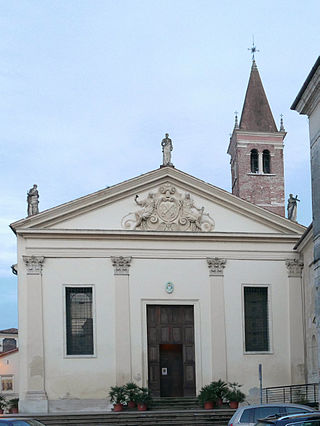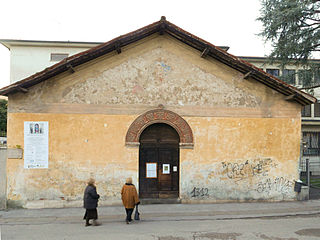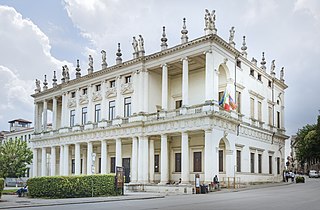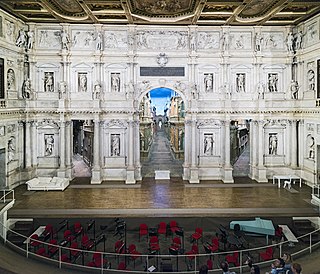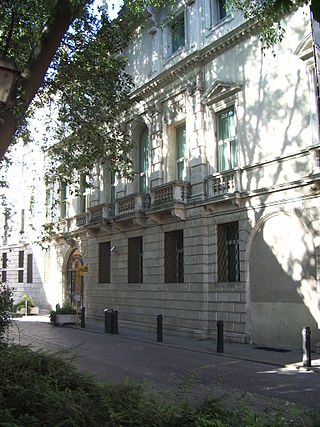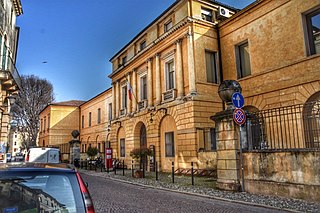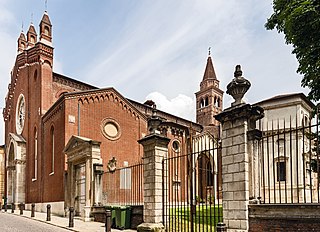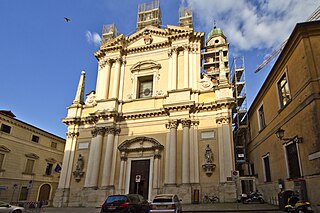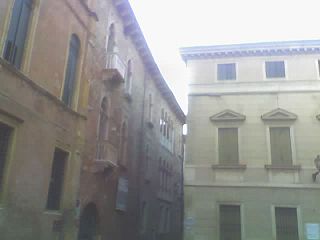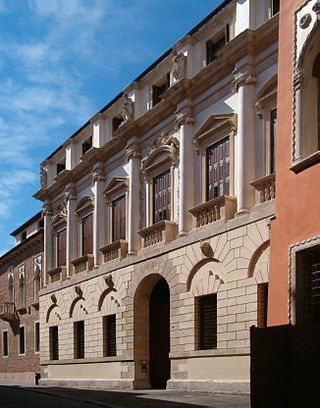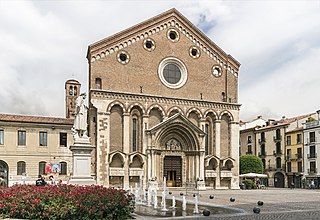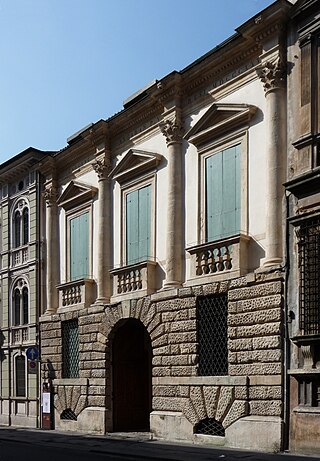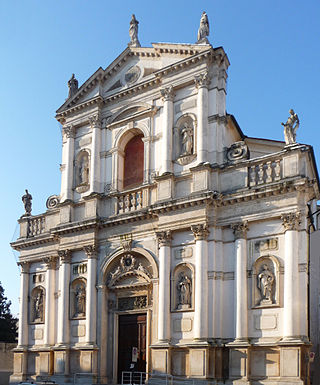Self-guided Sightseeing Tour #1 in Vicenza, Italy
Legend
Guided Free Walking Tours
Book free guided walking tours in Vicenza.
Guided Sightseeing Tours
Book guided sightseeing tours and activities in Vicenza.
Tour Facts
2.5 km
42 m
Experience Vicenza in Italy in a whole new way with our free self-guided sightseeing tour. This site not only offers you practical information and insider tips, but also a rich variety of activities and sights you shouldn't miss. Whether you love art and culture, want to explore historical sites or simply want to experience the vibrant atmosphere of a lively city - you'll find everything you need for your personal adventure here.
Activities in VicenzaIndividual Sights in VicenzaSight 1: Chiesa di San Pietro
The church and monastery of San Pietro, which gave its name to the homonymous village in the city of Vicenza, until 1810 were the main and managerial headquarters of the abbey of San Pietro, the oldest and most powerful Benedictine women's settlement in the Vicenza area. The church has become the parish seat, while the former monastery is used as a care institution for the elderly.
Sight 2: Oratorio dei Boccalotti
The Boccalotti Oratory is an oratory, located in Vicenza in Piazzetta San Pietro, built at the beginning of the fifteenth century, at that time annexed to the hospital of Santa Maria and Saints Peter and Paul.
Sight 3: Palazzo Chiericati
The Palazzo Chiericati is a Renaissance palace in Vicenza, designed by Andrea Palladio.
Sight 4: Casa Cogollo
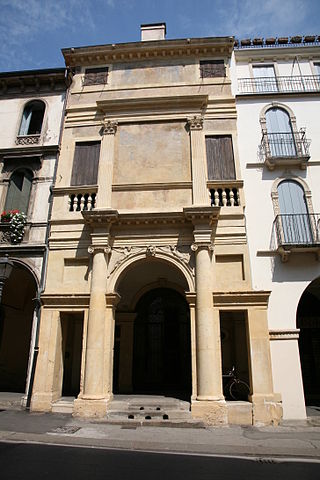
Casa Cogollo is a small palazzo in Vicenza built in 1559 and attributed to architect Andrea Palladio. Since 1994 it has formed part of the UNESCO World Heritage Site "City of Vicenza and the Palladian Villas of the Veneto".
Sight 5: Teatro Olimpico
The Teatro Olimpico is a theatre in Vicenza, northern Italy, constructed in 1580–1585. It was the final design by the Italian Renaissance architect Andrea Palladio and was not completed until after his death. The trompe-l'œil onstage scenery, designed by Vincenzo Scamozzi to give the appearance of long streets receding to a distant horizon, was installed in 1585 for the first performance held in the theatre, and is the oldest surviving stage set still in existence. The full Roman-style scaenae frons back screen across the stage is made from wood and stucco imitating marble. It was the home of the Accademia Olimpica, which was founded there in 1555.
Sight 6: Gallerie di palazzo Leoni Montanari
The Palazzo Leoni Montanari is a late Baroque palace located in Contra’ San Corona number 25 in central Vicenza in the Veneto region of Italy. It now houses exhibition rooms, meeting places, and art collections owned by the bank, Intesa Sanpaolo.
Sight 7: Museo Naturalistico Archeologico
The Naturalistic Archaeological Museum of Santa Corona in Vicenza, inaugurated in 1991, is located in the premises and cloisters of the former Dominican convent adjacent to the church of Santa Corona, in the historic center.
Sight 8: Chiesa di Santa Corona
Santa Corona is a Gothic-style, Roman Catholic church located in Vicenza, region of Veneto, Italy. The church contains the Valmarana chapel, whose design is attributed to the Renaissance architect Andrea Palladio. Palladio himself was initially buried in this church.
Sight 9: Chiesa di Santo Stefano
The church of Santo Stefano is a religious building in Vicenza, Italy, built in the Baroque style between the end of the seventeenth and the first half of the eighteenth century on the site of one of the oldest chapels in the city.
Sight 10: Palazzo Sesso Zen
Palazzo Sesso Zen is a thirteenth-century noble palace located in Vicenza, in contrà Giacomo Zanella nº 1, built in Venetian Gothic style.
Sight 11: Palazzo Porto
Palazzo Porto is a palace built by Italian Renaissance architect Andrea Palladio in Contrà Porti, Vicenza, Italy. It is one of two palaces in the city designed by Palladio for members of the Porto family. Commissioned by the noble Iseppo da Porto, just married, this building had a rather long designing stage and a longer and troublesome realization, partially unfinished.
Sight 12: Chiesa di San Lorenzo
The church of San Lorenzo is a Catholic place of worship in Vicenza, built at the end of the thirteenth century in Gothic style, in its Lombard-Po Valley version of the thirteenth century. It is located in the central Piazza San Lorenzo, along Corso Fogazzaro, and was officiated by the Conventual Franciscans until 2017.
Sight 13: Palazzo Schio Vaccari Lioy
Palazzo Schio is a patrician palace of the 16th century in Vicenza, northern Italy, whose facade was designed by the Italian Renaissance architect Andrea Palladio in 1565.
Sight 14: Chiesa di San Marco in San Girolamo
The Church of San Marco in San Girolamo is a baroque parish church in Vicenza, northern Italy, built in the 18th century by the Discalced Carmelites. It houses various artworks by artists of the early 18th century from Veneto. The sacristy preserves its original furniture of the same period.
Sight 15: Chiesa della Misericordia
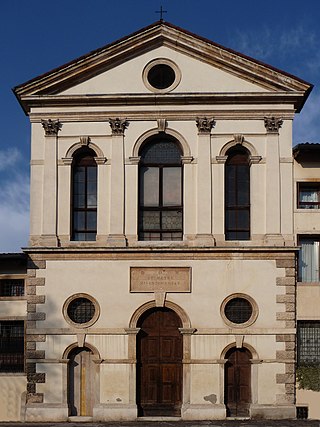
The Misericordia Hospital was one of the oldest hospitals in the city of Vicenza and, for several centuries, the main orphanage in the city. Of the buildings, located in the district of the same name in Borgo Pusterla, only the church of the Misericordia now remains, since 2010 officiated by the Serbian Orthodox parish of San Luca, while those used as an orphanage have been completely demolished or renovated for civilian use.
Share
How likely are you to recommend us?
Disclaimer Please be aware of your surroundings and do not enter private property. We are not liable for any damages that occur during the tours.
GPX-Download For navigation apps and GPS devices you can download the tour as a GPX file.
